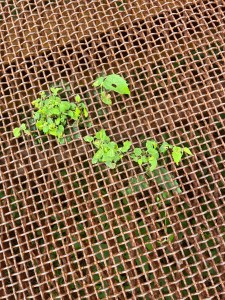My friend C is a member at the Ladybird Johnson Wildflower Center. And for the past… six weeks? two months?… we’ve met here on Wednesday mornings at next-door-to-8am in order to walk through whatever is jammed up in our hearts and heads. And for me to say out loud what faithful work I intend to accomplish across the week: I’d gotten jammed in that particular way during the winter. Anyway.
8am marks Member Mornings, a gift of the pandemic and the quiet season. Members could bring themselves (plus one other soul) an hour before opening time. It’s naturally sparse, human-wise, at that time and it’s before the day cranks up its heat. It works well for our dump, shake, and rummage practice.
I say “could” because this is Member Mornings’ final week for now — normal hours are resuming as children start being released for summer. The other difference today is that C is ill so I’m walking here alone… still rummaging, though.
**
The Wildflower Center is a wonderful, fascinating place. When they first set up in this location, I remember it was on the edge of everything Austin, ranchland among ranches next to the furthest edge of subdivisions. It’s intended for the study of this ecosystem, the property is, so it is wild.

Wild even as the highway that’s now pushed on from where it once stopped whooshes behind me. (It sounds like cars and less like the sea today.) The host of birds claim this as wild, so it must be true; their densely layered sounds affirm how much at home they are.
I was walking one of the field-trails — there are woods-trails too — and glanced in the highway’s direction. Through a gap in the “cedars” (Ashe junipers) I glimpsed a house. The suburbs have wrapped around this place just as the highway has.
And I thought — the way I think as I look at my front yard — about how every place where humans touch what we call nature
is ultimately our garden.

Because what makes this place wild? An agreement to leave plants (and creatures) alone. Which is why the birds, and the coral snakes, and and, have relaxed to go about their business as if we humans weren’t here.
Still, I know for a fact that not all plants get to grow in this wild place! Ligustrum gets promptly uprooted, as do nandinas of all sizes, along with many other escapees from suburban landscaping projects. We set our hands here, make choices here, shape what happens here just as much as any European aristocrat of the 17th century did on the lands where they lived.
There’s a way we might be here, in this folly where I sit, such that the gleeful grape and blackberry vines would not be making their way across/around. They would stay along the ground, and the metal would be unencumbered.

view of grapevines in the folly, with a tree-vista beyond
I don’t think that would be better… or worse. Not more or less natural — because once we turned our attention in this direction, we enmeshed ourselves. Everything after that has been gardening.
(I’m still bitter about a decades-ago conversation I had with an arborist with whom I will no longer work… “We don’t remove ball moss from trees. Ball moss is natural.” Yes, and my yard is not the middle of the woods. I want trees here, not a set of ball moss trellises… which is what I’ll have if my trees can’t get some competitive help. )
**

What if one of the aspects of the Genesis tale of the Garden of Eden — of God indicating human “dominion over the earth” — is less a directive on God’s part [Go do this thing you would not necessarily do!] and more an acknowledgement that, as an outgrowth of how we humans are made as human, we will be messing around with our world, the God-created parts as well as the us-created parts?
We will make things tame, or wild, or something between,
because we are always making, always choosing,
embedded in a world that we are shaping differently with every breath and step?
**
But then, perhaps all these other God-created entities are, too. Choose wisely, grasshopper.


